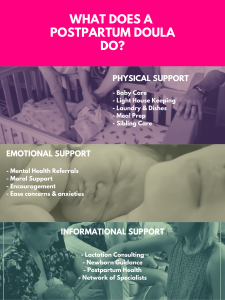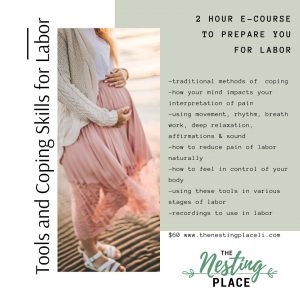
May 18, 2020 | Postpartum
I’m a postpartum doula on Long Island. The first response I get when I tell someone this is, “What is a postpartum doula? What do you do?” The answer is quite simple  and the service is a life-saver for many.
and the service is a life-saver for many.
Mothering The Mother
My job is to help Long Island postpartum moms who have recently birthed or adopted a baby. I help them cope, adjust, heal, and feel confident in their parenting. How do I do this? Well, I provide a myriad of services that combine into a practice of care and support.
The first tenant of being a postpartum doula is to “Mother the Mother.” Us doulas believe that every mama deserves to be nurtured with compassion; so, our role is to give motherly love and support. We don’t replace any client’s mom or other family member. In fact, we often work hand-in-hand with our clients’ family members to give as much help as possible.
What Services Postpartum Doulas Provide
 The types of services a postpartum doula does will depend on the doula. I provide full spectrum care to moms, which includes the following:
The types of services a postpartum doula does will depend on the doula. I provide full spectrum care to moms, which includes the following:
1. Emotional and physical support for mom
2. Postpartum care – help with healing and perineum care, c-section support, rest, and sleep
3. Infant care – educate the whole family on baby care best practices, help with bathing, sleep, feeding, and more
4. Feeding education – breast and formula
5. Nutrition – guidance for healing and lactation, meal and snack preparation
6. Household chores – light tasks such as washing dishes, doing laundry for the whole family, kitchen cleanup, and organizing the baby’s room
7. Family support – help partners and older children adjust to new family dynamic
8. Mental health – I’m trained to educate and identify perinatal mood and anxiety disorders such as postpartum depression and anxiety
9. Overnight care – I’ll take care of your baby’s needs throughout the night including diaper changes, bringing baby to you for breastfeeding, bottle feeding, and comforting baby so you can get a good night’s sleep
I do all this and even more!
What Postpartum Doulas Don’t Do
Postpartum doulas are not medical health providers. While we can provide evidence-based information on care, we aren’t doctors and cannot answer medical questions. When appropriate, we will refer clients to their pediatricians.
Sometimes people assume we are just like babysitters. However, our job is to put the mom first, not baby. Postpartum doulas will often watch over the baby so that mom can get some rest. But, we don’t completely take over care for extended periods of time unless we are providing overnight care. More importantly we are highly trained professionals that receive certification credentials.
We also typically do not do heavy cleaning like vacuuming, washing the floors, cleaning the bathroom, etc.
Learn More
Are you a Long Island mom looking for support? Contact me or learn more about postpartum care here.

Apr 23, 2020 | Birth, Coping Skills
Coping During Natural Birth Pain. How Do I Do It?
Is coping through natural birth pain possible? This is the most frequent question I get from moms, whether they’re approaching their first or fifth birth. Labor pain appears to be the number one concern about birthing. Many believe an epidural is their only option. But I’m here to tell you, that there are more natural alternatives than you may think.
If having a natural, meaning no medical interventions, birth is important to you, then you’re going to want all the information you can get on coping with labor pain. And yes, I’m saying pain. Some educators don’t like to use the “p” word, mostly because as soon as we hear that word we tense up and think of it negatively. But I want to be realistic here. Yes, it is pain, but it’s not negative. It has a beautiful purpose and it is possible to naturally reduce labor pain through coping techniques.
Become The Ruler Of Your Mind
Staying relaxed and as calm as possible during natural birth contractions is very important. When we feel pain, our body’s stress response is called to action. We get a rush of adrenaline and cortisol, leading to a faster heart rate and increased breathing. This isn’t a bad thing. Our body is trying to help us prepare for fight or flight and the chemicals that flood our body actually helps reduce pain. I know, cool, right?
But the downside of the stress response is that it can quickly turn us to panic and fear if we don’t know how to control it. The trick to coping in labor is to become the ruler of your mind.
You’re already a queen. Now you need to be the queen of your thoughts by thinking positively and learning physical and mental skills to harness your power and focus.

How Do I Learn These Skills?
You can read as many free articles and resources about labor pain coping skills as possible. However, this will not compare to learning these methods from an actual childbirth educator. Reducing pain naturally during labor requires practice throughout pregnancy and you need someone who can go in depth about these techniques and give you alternatives that you can’t get elsewhere.
This is why I’ve partnered with The Nesting Place LI to offer a new online class that deals solely with natural birth coping skills and why all of my online birth education courses cover comfort measures and coping techniques.

Mar 17, 2020 | Mental Health, Postpartum, Pregnancy
Isolation can be a real trigger for depression, especially since so many of us are now practicing social distancing and self quarantine because of COVID-19 (coronavirus). Pregnant and new moms, in particular, can be at-risk of prenatal and postpartum mood and anxiety disorders (PMADs). Just because we’re stuck home, doesn’t mean we have to do it all alone!
While things will return to normal eventually, here are five things you can do today to help prevent isolation depression and anxiety.
1. Virtual Support
Many birth workers and care providers are adapting to the current situation by providing virtual support via web chat. There are apps that provide chat and over-the-phone access to therapists. You can look for a pregnancy or postpartum support group online, like this one from The Nesting Place.
Birth and postpartum doulas are also offering online care. I’m still able to chat with clients, show them newborn care basics, help with lactation, and provide emotional support and encouragement. If you’re interested in getting a postpartum doula virtually, contact me.
You can also talk to friends and family members via Skype, Facetime, Facebook chat, or on the phone to avoid feeling alone.
2. Get Some Fresh Air
If you’re able, sit outside in your backyard or balcony for a while. Get some fresh air and Vitamin D. Just getting outside, without running into other people, can be so refreshing and uplifting. If you live in an apartment and can’t leave, but the weather isn’t too chilly, try opening the windows for a little while. Let in the sunshine. Take in its warmth for a moment. Nature can offer some relief.
 3. Exercise
3. Exercise
Get those endorphins pumping! If you’re pregnant or in postpartum and cleared for gentle exercise, stream some prenatal workouts on YouTube. Prenatal yoga and meditation can be calming. You don’t have to exercise all day, but even twenty minutes can make a big difference in how we feel. If you’re new to yoga, check out this YouTube workout for beginners.
4. Read
Reading is a total immersive experience that’s good for your brain! Stories can transport you out of your current environment. According to a study by Emory University, reading activates neurons in the brain that create a sensation of not just reading about the action of the book, but experiencing the sensations it is describing. You are figuratively and biologically put in the shoes of another. This is called grounded cognition.
Reading can also help to calm the mind and help it focus if you’re feeling anxious.
5. Find and List Resources
Sometimes just being prepared helps us feel more calm and in control. Do some research on local and other online resources you may want to use during this time like restaurants that are still doing delivery, your care providers’ emergency numbers and assistance programs in your area. You don’t have to use any of these if you don’t need to, but having a list of people to call may help you feel more connected. Many of us are isolated at this moment. It’s important to remember that there are networks of people in every community that are still out there to help you.
Sending you love through this difficult time!
Cass

Mar 13, 2020 | Birth, Postpartum
Tensions about COVID-19, a type of coronavirus, are rising in the United States as the illness has been spreading. Travel is becoming restricted, people are working from home, schools are closing, and apparently toilet paper is now a hot commodity. Many are starting to panic. The symptoms of COVID-19 have mainly proven to be more serious in older patients and those with serious complications such as heart and lung disease, and diabetes. But what about pregnant women and new moms?
Are Pregnant Women More Susceptible to Getting COVID-19 or at Higher Risk of Serious Illness?
At this time, the CDC does not have conclusive information. However, the physiological changes women experience during pregnancy do tend to make them more susceptible to viral respiratory infections. The CDC advises pregnant women to take standard precautions like washing their hands and avoiding other people who are sick.
Can COVID-19 be Transmitted to Babies During Pregnancy or Vaginal Birth?
The virus is currently thought to only be spread through respiratory droplets, meaning through fluids expelled by the mouth and nose during coughs, sneezes or intimate contact. It is unknown if the virus can be transmitted through the womb. However, the CDC said, “In limited recent case series of infants born to mothers with COVID-19 published in the peer-reviewed literature, none of the infants have tested positive for the virus that causes COVID-19. Additionally, virus was not detected in samples of amniotic fluid or breastmilk.”
Can I Continue Breastfeeding?
 So far, no evidence of the virus has been found in breast milk. La Leche League International (LLLI) advises women to continue breastfeeding unless a care provider deems it medically necessary to stop. Human milk provides important immunological antibodies produced in the mothers body to the baby.
So far, no evidence of the virus has been found in breast milk. La Leche League International (LLLI) advises women to continue breastfeeding unless a care provider deems it medically necessary to stop. Human milk provides important immunological antibodies produced in the mothers body to the baby.
LLLI says, “Those who become infected shortly before giving birth and then begin breastfeeding, and those who become infected while breastfeeding, will produce specific secretory IgA antibodies and many other critical immune factors in their milk to protect their nursing infants and enhance their infants’ own immune responses. At this time, these immunologic factors will aid their infants’ bodies to respond more effectively to exposure and infection. Following good hygiene practices will also help reduce transfer of the virus.”
For more information on pregnancy and birth in relation to COVID-19 (coronavirus), please visit the CDC here.

Feb 24, 2020 | Birth
The nursery is ready, you’ve gotten everything on your baby registry, and your pregnancy is nearing full term. But do you know how to labor effectively and push baby out?
We tend to over prepare for our babies’ arrival in ways that help us when we’re past the finish line, in postpartum. That’s all well and good, but we need to get ready for those last few miles of pregnancy, too. I’m likening pregnancy and labor to a marathon because it is! Actually, it’s even harder. Don’t worry, though. You’re tougher than all of it.
If runners have to train, be knowledgeable about their bodies and have the right tools to finish their marathon, then so do you! It’s important to be educated about labor and birth so you can be more prepared. Just picture it – you’ve been in labor for quite a while. Then your care provider tells you it’s time to push. You’re mentally, emotionally and physically tired. You can see the finish line but it’s one mile uphill. You may be tempted to tell your care provider to go do something unsavory. But you won’t – because you will know exactly what you’ll need to do next.
BEAR DOWN
Have you heard this phrase? You probably have A LOT lately. You’ll be ready to push when you reach 10 cm dilation and feel a lot of pressure on your vagina and rectum, almost like you really need to poop (I know, gross, but it’s true). It’s at this point that you’ll want to bear down (exert pressure) and push.
BREATHING
via GIPHY
We’ve all seen “hee, hoo, hee, hoo” breathing in TV and movies during birth scenes. This type of restricted breathing was popularized by Lamaze. However, Lamaze stopped teaching it in the 1980s, so popular culture needs to quit it with this one.
Evidence shows us that the most effective way to breathe during labor and pushing is whatever is most comfortable for the mom. Diaphragmatic, or belly, breathing is usually a very pleasant breathing technique for women during labor. When you feel a contraction coming on during pushing, try to take in a breath and then try to slowly release it while you bear down. Do whatever works best for you!
BE PREPARED
Don’t run your marathon without getting ready. There’s so much more to learn about labor and birth. Get all the tools and knowledge you’ll need by taking a childbirth education course. You’re almost there! You’ll be in labor soon enough.

 and the service is a life-saver for many.
and the service is a life-saver for many. The types of services a postpartum doula does will depend on the doula. I provide full spectrum care to moms, which includes the following:
The types of services a postpartum doula does will depend on the doula. I provide full spectrum care to moms, which includes the following:




 3. Exercise
3. Exercise
 So far, no evidence of the virus has been found in breast milk.
So far, no evidence of the virus has been found in breast milk. 
Recent Comments